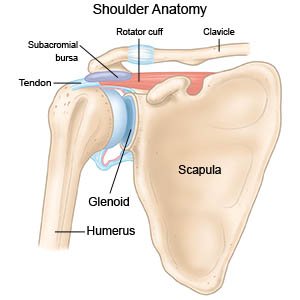Shoulder Pain
Medically reviewed by Drugs.com. Last updated on Nov 3, 2024.
What do I need to know about shoulder pain?
Shoulder pain is a common problem that can affect your daily activities. Pain can be caused by a problem within your shoulder, such as soreness of a tendon or bursa. A tendon is a cord of tough tissue that connects your muscles to your bones. The bursa is a fluid-filled sac that acts as a cushion between a bone and a tendon. Shoulder pain may also be caused by pain that spreads to your shoulder from another part of your body.
 |
What increases my risk for shoulder pain?
- Repeated overhead activities, such as baseball, weight lifting, or swimming
- Medical conditions, such as rotator cuff disease, diabetes, or thyroid disorders
- A quick increase in the amount or intensity of exercises, or improper technique during exercise
- Muscle imbalance or weakness
- Trauma or a fall
- Age older than 60
How is shoulder pain diagnosed?
Your healthcare provider will ask about your pain, including how and when it started. Tell him or her if you have any weakness or if there was an injury. He or she will examine your shoulder and do tests to see how well you can move your shoulder. You may also need any of the following tests:
- An x-ray, ultrasound, CT, or MRI may be needed to show the cause of your shoulder pain. You may be given contrast liquid to help the shoulder area show up better in the pictures. Tell the healthcare provider if you have ever had an allergic reaction to contrast liquid. Do not enter the MRI room with anything metal. Metal can cause serious injury. Tell the healthcare provider if you have any metal in or on your body.
- An electromyography test measures the electrical activity of your muscles at rest and with movement.
How is shoulder pain treated?
- Acetaminophen decreases pain and fever. It is available without a doctor's order. Ask how much to take and how often to take it. Follow directions. Read the labels of all other medicines you are using to see if they also contain acetaminophen, or ask your doctor or pharmacist. Acetaminophen can cause liver damage if not taken correctly.
- NSAIDs , such as ibuprofen, help decrease swelling, pain, and fever. This medicine is available with or without a doctor's order. NSAIDs can cause stomach bleeding or kidney problems in certain people. If you take blood thinner medicine, always ask your healthcare provider if NSAIDs are safe for you. Always read the medicine label and follow directions.
- A steroid injection may help decrease pain and swelling.
- Surgery may be needed for long-term pain and loss of function.
Treatment options
The following list of medications are related to or used in the treatment of this condition.
How can I manage my symptoms?
- Apply ice on your shoulder for 20 to 30 minutes every 2 hours or as directed. Use an ice pack, or put crushed ice in a plastic bag. Cover it with a towel before you apply it to your shoulder. Ice helps prevent tissue damage and decreases swelling and pain.
- Apply heat if ice does not help your symptoms. Apply heat on your shoulder for 20 to 30 minutes every 2 hours for as many days as directed. Heat helps decrease pain and muscle spasms.
- Limit activities as directed. Try to avoid repeated overhead movements.
- Go to physical or occupational therapy as directed. A physical therapist teaches you exercises to help improve movement and strength, and to decrease pain. An occupational therapist teaches you skills to help with your daily activities.
How can I help prevent shoulder pain?
- Maintain a good range of motion in your shoulder. Ask your healthcare provider which exercises you should do on a regular basis after you have healed.
- Stretch and strengthen your shoulder. Use proper technique during exercises and sports.
When should I seek immediate care?
- You have severe pain.
- You cannot move your arm or shoulder.
- You have numbness or tingling in your shoulder or arm.
When should I contact my healthcare provider?
- Your pain gets worse or does not go away with treatment.
- You have trouble moving your arm or shoulder.
- You have questions or concerns about your condition or care.
Care Agreement
You have the right to help plan your care. Learn about your health condition and how it may be treated. Discuss treatment options with your healthcare providers to decide what care you want to receive. You always have the right to refuse treatment. The above information is an educational aid only. It is not intended as medical advice for individual conditions or treatments. Talk to your doctor, nurse or pharmacist before following any medical regimen to see if it is safe and effective for you.© Copyright Merative 2024 Information is for End User's use only and may not be sold, redistributed or otherwise used for commercial purposes.
Learn more about Shoulder Pain
Treatment options
Care guides
Medicine.com guides (external)
Further information
Always consult your healthcare provider to ensure the information displayed on this page applies to your personal circumstances.
